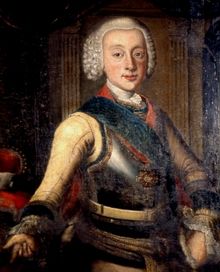Frederick Augustus, Prince of Anhalt-Zerbst

Frederick Augustus, Prince of Anhalt-Zerbst (8 August 1734 in Alt Stettin – 3 March 1793 in Luxembourg), was a German prince of the House of Ascania and the last ruler of the Principality of Anhalt-Zerbst.
He was the second and sole surviving son of Christian Augustus, Prince of Anhalt-Zerbst (since 1742 of all Anhalt-Zerbst) by his wife Johanna Elisabeth, daughter of Christian August of Schleswig-Holstein-Gottorp, Prince of Eutin, and was a younger brother of Russia's Catherine the Great.
Life
Frederick Augustus succeeded his father in Anhalt-Zerbst in 1747, at the age of thirteen. His mother, the Dowager Princess Johanna Elisabeth, acted as regent on his behalf until 1752.
He was one of the sovereigns who supported Britain in the American Revolutionary War with soldiers. For this, he received a substantial monetary compensation.
In 1776 he granted religious tolerance in his lands.
Due to a quarrel with the Kingdom of Prussia, he was forced to flee into exile in Basel and later Luxembourg, where he died.
Marriages and Succession

In Zerbst on 17 November 1753 Frederick Augustus married firstly with Caroline (b. Kassel 10 May 1732 - d. Zerbst, 22 May 1759), daughter of Prince Maximilian of Hesse-Kassel and granddaughter of Charles I, Landgrave of Hesse-Kassel. The marriage was childless.
In Ballenstedt on 27 May 1764 Frederick Augustus married secondly with Fredericka Auguste Sophie (b. Ballenstedt, 28 August 1744 - d. Coswig, 12 April 1827), daughter of Victor Frederick, Prince of Anhalt-Bernburg. Like the first marriage, this union was childless.
On his death the line of Anhalt-Zerbst became extinct and the succession to the principality was disputed between the other branches of Anhalt-Bernburg, Anhalt-Köthen and Anhalt-Dessau; finally, in 1796 Anhalt-Zerbst was divided and ceased to exist.
The dominion of Jever (which was annexed to Zerbst by the marriage of Prince Rudolph with Magdalene of Oldenburg, heiress of that land) was ruled under the Semi-Salic Law; for this, was given to the Empress Catherine II of Russia, born Princess Sophie Auguste Fredericka of Anhalt-Zerbst and Frederick Augustus's only surviving sibling.
